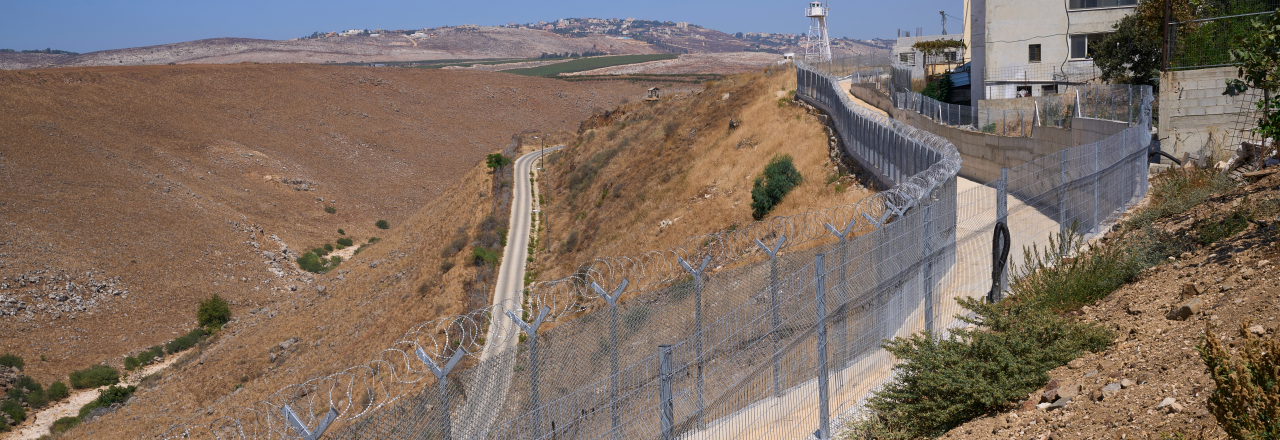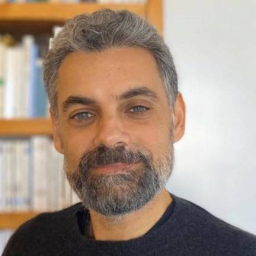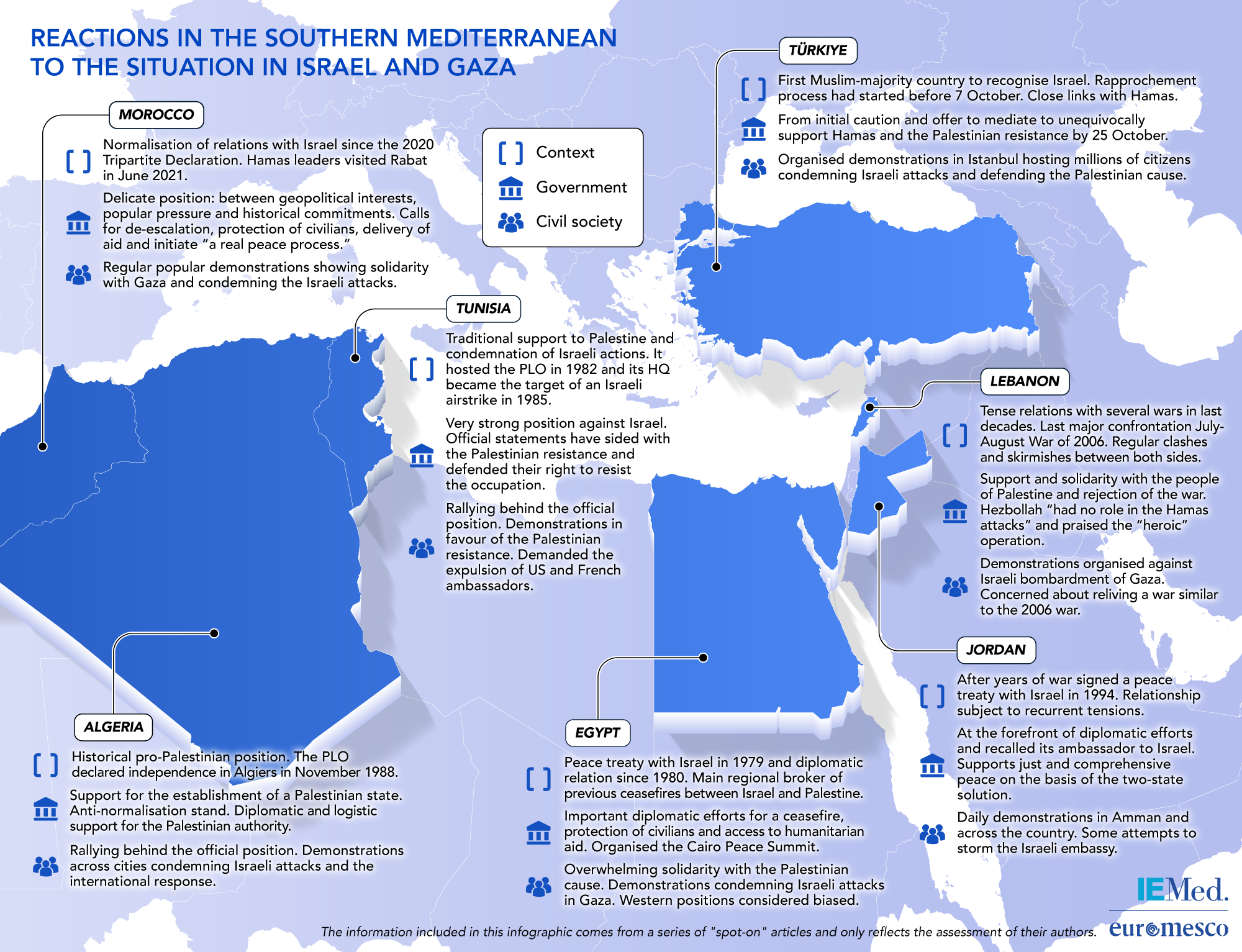

Abstract
On 7 October 2023, the Palestinian armed group Hamas – acronym in Arabic for ‘Movement of Islamic Resistance’ – attacked the outskirts of Gaza inside the Israeli southern territory, killing more than a thousand Israelis, between military personnel – inside targeted barracks – and civilians in several kibbutz and other neighbouring towns. This offensive has shaken Israel to the core and led to a massive military retaliation against the Palestinian population inside the Gaza strip, causing unspeakable losses of lives and suffering, with more than 10,000 casualties killed so far, among whom half are children.
This tragic escalation of violence between Hamas and Israel brought direct implications to the Lebanese context, which constitutes a standing front between the Lebanese militia Hezbollah and Israel, as the two countries are still officially at war. Since the July-August War of 2006, the Lebanese-Israeli conflict was punctuated by balanced rules of engagement, with regular clashes and skirmishes between the two sides.
The day after the Hamas attacks, the Lebanese front reignited with shelling occurring from and into the two countries, leading to casualties. Fears started to rise in Lebanon as to the possible extension of the conflict engulfing the country into a new round of destruction as in 2006. Lebanon and its population are already extremely vulnerable as its economic situation has been crumbling since October 2019, due to a historic multidimensional crisis, coupled with acute institutional paralysis.
Since October 2022, the country is undergoing once again a dangerous void among its key political institutions, as Lebanese parliamentarians were unable to elect a new President of the Republic. The Cabinet is handled by a caretaker government and the Parliament is unable to enact legislation until the issue of the election of the country’s president is addressed.
Official Reactions
As such, the war in Gaza and the related escalation at the Lebanese southern border are occurring as the country’s formal authorities are extremely weakened because of the deep political and financial crisis. Despite the fragmented nature of the Lebanese political landscape, the State formal doctrine supports Hezbollah as a “resistance group” to liberate disputed territories in Southern Lebanon, in addition to the “right of Lebanon to defend itself”.
Even without a President, the Lebanese authorities quickly stated that “the Lebanese people do not want war”, while voicing support and solidarity with the people of Palestine and particularly in Gaza, while expressing concern as to the risks of total war with Israel. In the aftermath of a joint Arab and Islamic summit in Riyad on 12 November, caretaker Prime Minister Najib Mikati stated that “Hezbollah is showing a lot of patriotism” adding that he was reassured by the party’s “wisdom”, calling on Arab countries to exert pressure on Israel to stop its “provocations” against Southern Lebanon.
As escalation was on the rise, the caretaker Cabinet managed to meet on 20 October to discuss potential emergency measures to be planned in the case of a larger conflict with Israel. A ministerial committee was also formed to facilitate foreign nationals’ evacuation from Lebanon in the event of war, as many embassies and international organisations had already evacuated most of their foreign personnel.
The Secretary General Hassan Nasrallah of Hezbollah, a major actor in the unfolding events in the southern border, has made two speeches since the beginning of the conflict. He stated that his group had no role in the 7 October attacks by Hamas and praised the “heroic” operation, depicting it as “a seismic shock that rocked Israel on many levels: political, security, military and psychological”, while condemning the Israeli offensive against the population in Gaza.
Nasrallah explained how Hezbollah engaged in the conflict the very next day of the Hamas operation, paying a high tribute as he praised the “martyr” of 57 fighters that had died in the confrontations with Israel, at the time of his first speech on 3 November. “We’re living in a jungle, he said, holding the United States “totally responsible for the war raging in Gaza, against unarmed defenceless people”, thus keeping “all options on the table” and entertaining a “constructive haze” around the group’s intentions.
Opposition voices in Lebanon were raised against Hezbollah’s actions putting at risk the safety and security of the Lebanese. Opposition leader and head of the Kataeb Party, Member of Parliament (MP) Samy Gemayel condemned Hezbollah for “hijacking the right of the Lebanese people and its official institutions to decide how to deal with this threat”. A week before he had signed, alongside 30 other Lebanese MPs, an appeal expressing concern over the fact that the decision-making process of the Lebanese State was “being sullied by an illegitimate armed force serving a regional axis, jeopardizing strategic interests, security and stability”, urging to avoid dragging Lebanon into the war.

Public Reactions
The images of destruction and massive killings of entire families with their children and babies by the Israeli army has deeply moved large parts of the Lebanese public. Protests were organised in Beirut denouncing Western support for the Israeli military’s ongoing bombardment of Gaza.
At the same time, the Lebanese are greatly worried about the impact of the ongoing conflict and how it could further impact their ongoing ordeal due to the deep financial and economic crisis that has hit the country in the recent years. Because of the current crisis, Lebanon is already enduring the highest global real inflation rate in food prices, according to the World Bank’s Food Security Update, published on 12 October. As such, Lebanese have started to stock up food, water and fuel in the event of shortages that would feed into an insidious black market should a larger conflict erupt, further disrupting the movement of goods and supplies.
Thus, the Lebanese are deeply concerned about the possibility of reliving a war similar to that of 2006, during which 33 days of bombings led to the large destruction of many villages in Southern Lebanon and the Beirut southern suburbs, known to be Hezbollah strongholds. The Lebanese infrastructure, such as the airport runways, electric and water facilities, in addition to bridges, were also deeply damaged by the war, as it took years for the country to get back on its feet.
In August 2020, the country also endured the grave devastation of its capital due to the double blast at the Beirut Port caused by the improper stocking of thousands of tons of ammonium nitrate which exploded in a warehouse that caught fire. Thus, many believe a new cycle of devastation against a bankrupt country and gravely impoverished population could bring Lebanon durably and permanently to its knees.
Impact on Lebanon
At the time of writing of this brief, the Israeli bombings had killed 11 Lebanese civilians in addition to 82 Hezbollah and Palestinian combatants killed in Lebanon and Syria. According to the Armed Conflict Location and Event Data, an NGO specialising in conflict data collection, Israel has struck Lebanon 553 times since 8 October.
On 13 October, Reuters journalist Issam Abdallah was killed and six other journalists, including two from La Agence France-Presse (AFP), were wounded by Israeli strikes while covering the cross-border fighting close to the Blue Line.
On 5 November, an Israeli bombing killed four civilians, including three children, and injured paramedics. The strike targeted a civilian vehicle in Ghodmata, between Aitaroun and Ainata, killing a woman and her three grandchildren. This development led Hezbollah to fire in retaliation against the Israeli town of Kiryat Shmona, killing one civilian and wounding several others.
An Israeli shelling hit a hospital in Southern Lebanon, injuring a United Nations Interim Force in Lebanon (UNIFIL) peacekeeper, while the Israeli army increased the range of its targets, hitting Hezbollah facilities as deep as 40 km into Lebanon. Hezbollah responded by resorting to kamikaze drones striking the southern Israeli city of Eilat.
On 12 November, the situation further escalated as Hezbollah launched its largest attack on Israel, killing one civilian and wounding 18 others, including soldiers. The Lebanese branch of Hamas also launched rockets from Lebanon at the northern outskirts of Haifa, about 40 km from the Lebanese border.
At the same time, the ongoing fighting has led to the displacement of more than 26,000 Lebanese whom have fled further north and into the mountains to escape the dangers of the military escalation. They were faced with the challenge of affording much higher rents than those before the conflict erupted, as many landlords are trying to exploit the situation. On the other hand, central authorities and municipalities have been working on providing shelter in public schools and public facilities for the displaced population from the South.
Furthermore, the conflict is being quite detrimental to the environmental sector due to what officials have described as a “scorched earth policy”, in a region largely reliant on agriculture. As a result, the olive harvest, an essential source of income for the inhabitants was wasted, and some 40,000 olive trees have been decimated in fires caused by Israeli bombings, which have so far devastated more than 460 hectares of farmland and forests. Israel was also accused by Human Rights Watch of using white phosphorous, an “unlawfully indiscriminate munition […] and cause egregious harm to civilians”.
As the attacks against the Gaza population continue, Hezbollah and Israel are risking one provocation too many which could turn the escalation at the Lebanese-Israeli border into a full-fledged war. At the same time, the Lebanese authorities have no control over the unfolding events and situation, as they cannot impose nor influence the conduct of Hezbollah. The Iranian backed resistance group is presently holding, alongside Israel, the decision over peace and war in Lebanon. As Hassan Nasrallah had stated in his second speech on 11 November, “now is the time when the battlefield has the final say to dictate the course of the war against the Israeli enemy”.


